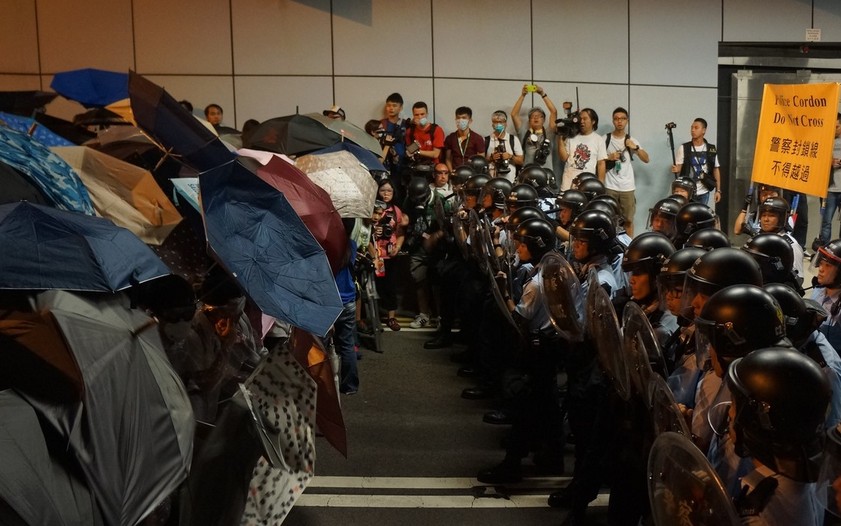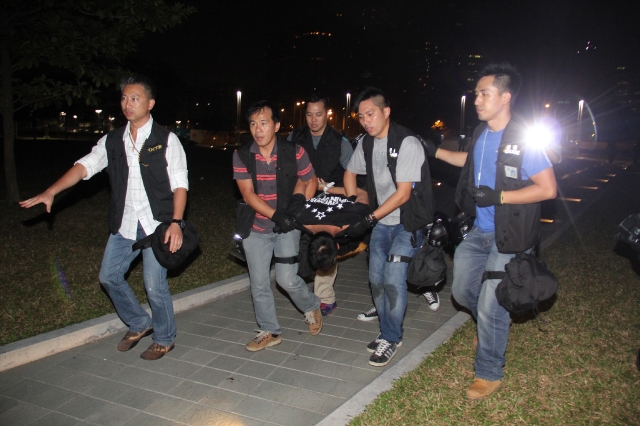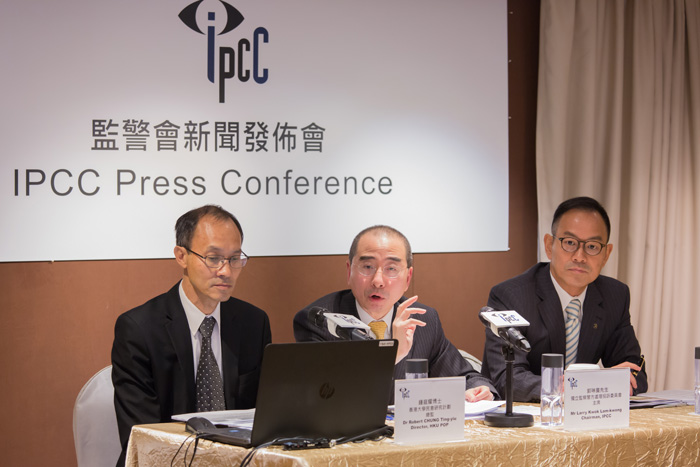
The United Nations Committee Against Torture has published a set of recommendations for the Hong Kong government, urging it to duly prosecute officers who were complicit in, or allowed, any excessive use of force during last year’s pro-democracy Occupy protests. It recommended that the government ensure that any who are found guilty are convicted with adequate penalties.

The committee’s “concluding observations” report, published on Wednesday, came after a periodic report on torture was submitted to them by the government three weeks ago. The responses from the government delegation were heard in Geneva in November, where members of the committee questioned the police’s use of force at the Occupy protests.
The committee said it was concerned about the excessive use of tear gas, batons, and pepper spray on protesters during the Occupy protests, which had been consistently reported. They were also concerned that police had resorted to using force against more than 1,300 people during the protests, with around 500 subsequently admitted to hospital.

It also expressed concern at allegations of threats of sexual violence and assaults by the police on demonstrators which occurred when the protesters were following instructions and leaving protest zones. The report also cited various instances of violence perpetrated by counter-demonstrators.
The committee recommended the government should:
- Conduct an independent investigation into the allegations of the excessive use of force by the police and anti-demonstrators during the Occupy protests;
- Duly prosecute alleged perpetrators, including those officers who were complicit in, or allowed, those acts to occur, and ensure that those found guilty are convicted with adequate penalties;
- Provide full redress to the victims, including fair and adequate compensation;
- Publicise the Police General Orders and related guidelines on the use of force, and make sure that they are in compliance with international standards;
- Strengthen ongoing training for all law enforcement officers on the absolute prohibition of torture, and on international standards on the use of force, as well as on their liability in the event of excessive use of force.
“The Police have strict guidelines on the use of force and stringent training courses. The force to be used by police officers shall be the minimum force necessary according to the circumstances at the time and for achieving a lawful purpose,” the government said in response to the report.

Expert investigation committee wanted
The Hong Kong Human Rights Monitor (HKHRM) issued a statement that stated they welcomed the recommendations from the United Nations.
“We have urged the government to set up a statutory investigation committee with international human rights experts to investigate the situation of the police and anti-demonstrators using inappropriate force during the umbrella movement, including the situation of conniving and harbouring subordinates in the police force, and it should publish the results for people to follow up and seek justice,” the statement read.
Without naming cases, the HKHRM also said the report indirectly expressed concerns over two prominent violent cases. The insinuated cases are likely to be Ken Tsang’s assault from seven police officers and, the now-retired, officer Frankly Chu, who assaulted pedestrians passing by, both during the Occupy protests.
“The HKHRM hopes that in the case of the seven police officers, the authorities can carry out the prosecution properly, that officers will not ‘go easy’ when they testify [against the seven officers],” the statement read.
“If the government tries to let the officers – who beat up citizens and broke the law – get away… it will seriously damage the police’s image and its ability to enforce the law in the future, it is also a huge challenge to the rule of law principle when law is exercised selectively,” the statement added.

Independent mechanism to investigate police
The UN committee also remained concerned that investigations into police complaints were being conducted by the Complaints Against Police Office (CAPO), an internal unit of the police.
They noted that the Independent Police Complaints Council (IPCC) remains an advisory and oversight body of CAPO’s investigations, with no power to conduct investigations on its own.
In the last periodic committee report in 2008, they urged the government to establish a fully independent mechanism to investigate complaints on police misconduct. In Wednesday’s report, the committee reiterated this recommendation.
“There is a well-established police complaint handling mechanism in Hong Kong,” the government said in response.
“In recent years, the Police have also implemented various measures to enhance public understanding of police work so as to reduce complaints arising from misunderstandings,” the government said.

‘Rough response’
The committee also made some 30 other recommendations on issues such as refugee protection, solitary confinement and the use of restraints, domestic workers, transgender and intersex persons, which the Hong Kong delegation of civil groups mentioned at the November hearing in Geneva.
The government said that it appreciated the committee’s goodwill in making the recommendations and respected their views.
“We will make suitable judgements according to the prevailing circumstances and implement the Committee’s feasible and practicable recommendations in the light of Hong Kong’s unique circumstances,” a spokesperson for the Constitutional and Mainland Affairs Bureau said.
However, the HKHRM criticised the government’s lack of response on many concerns and recommendations, saying the responses were drafted “roughly,” especially in regards to the recommendations about police power and the police monitoring mechanism.
“[The government] has stressed repeatedly the current measures are well-established, [it] has refused to admit the flaws and refused to improve,” the HKHRM said.
The group also questioned the government’s decision to publish the response late on Wednesday evening, suspecting this was intended to reduce media exposure and weaken the impact of the report.
